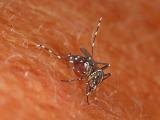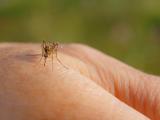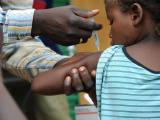May 2, 2006 (CIDRAP News) – The first published report of a phase 1 clinical trial of a West Nile virus vaccine shows promise, with 41 of 42 inoculated volunteers (98%) developing antibodies to the virus.
The double-blind, randomized, placebo-controlled trial, described in the April 25 issue of the Proceedings of the National Academy of Sciences, involved 80 volunteers. Thirty people in the study received a single high dose of the vaccine (5.0 log10 plaque-forming units [pfu]), 15 received a low dose (3.0 log10 pfu), 5 "active controls" received a vaccine against yellow fever—a relative of West Nile—and 30 received a placebo.
Of those tested 28 days after vaccination, all 14 low-dose recipients and 27 of the 28 high-dose recipients developed West Nile antibodies. The mean antibody titers were rated as high at 1,218 and 1,280, respectively. In addition, most of the volunteers had specific T-cell responses. The vaccinated volunteers and controls reported a similar frequency of adverse events.
These findings, first reported a year ago at the National Foundation for Infectious Disease's annual conference, show that the vaccine "could be useful in preventing illness and limiting outbreaks of West Nile virus infection," according to the authors of the study.
The vaccine, ChimeriVax-West Nile, is manufactured by Acambis, and the research team was composed mainly of Acambis researchers. The vaccine is based on a live, attenuated yellow fever virus vaccine. Genes from the yellow fever vaccine that induce immunity in humans (the premembrane and envelope genes) are replaced with similar genes from the West Nile virus.
ChimeriVax-West Nile is now involved in a phase 2 trial in the United States comprising more than 200 healthy young adults, according to Acambis. After that, the vaccine will be tested in healthy elderly volunteers.
According to the Centers for Disease Control and Prevention (CDC), West Nile virus, a flavivirus, infected at least 2,949 people in 2005, causing 116 deaths. Although 80% of those infected will have no symptoms, about 20% of infected patients will develop a fever, headache, tiredness, body aches, and, occasionally, a rash on the trunk. And 1 in 150 patients, according to the CDC, develops severe neuroinvasive disease, such as encephalitis, meningitis, or poliomyelitis.
Monath TP, Liu J, Kanesa-Thasan N, et al. A live, attenuated recombinant West Nile virus vaccine. Proc Nat Acad Sci 2006 Apr 25;103(17):6694-9 [Full text]
See also:
May 11, 2005, CIDRAP News story "West Nile vaccine looks good in early human trial"

















